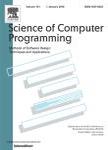版权所有:内蒙古大学图书馆 技术提供:维普资讯• 智图
内蒙古自治区呼和浩特市赛罕区大学西街235号 邮编: 010021

作者机构:Univ Kansas Informat Technol & Telecommun Ctr Dept Elect Engn & Comp Sci Lawrence KS 66045 USA Signalicorp Portland OR 97212 USA
出 版 物:《SCIENCE OF COMPUTER PROGRAMMING》 (计算机程序设计科学)
年 卷 期:2010年第75卷第7期
页 面:543-572页
核心收录:
学科分类:08[工学] 0835[工学-软件工程] 0812[工学-计算机科学与技术(可授工学、理学学位)]
主 题:Generic programming Modular semantics
摘 要:Modular Monadic Semantics (MMS) is a well-known mechanism for structuring modular denotational semantic definitions for programming languages. The principal attraction of MMS is that families of language constructs can be independently specified and later combined in a mix-and-match fashion to create a complete language semantics. This has proved useful for constructing formal, yet executable, semantics when prototyping languages. In this work we demonstrate that MMS has an additional software engineering benefit. In addition to composing semantics for various language constructs, we can use MMS to compose various differing semantics for the same language constructs. This capability allows us to compose and reuse orthogonal language tasks such as type checking and compilation. We describe algebra combinators, the principal vehicle for achieving this reuse, along with a series of applications of the technique for common language processing tasks. (C) 2010 Elsevier B.V. All rights reserved.